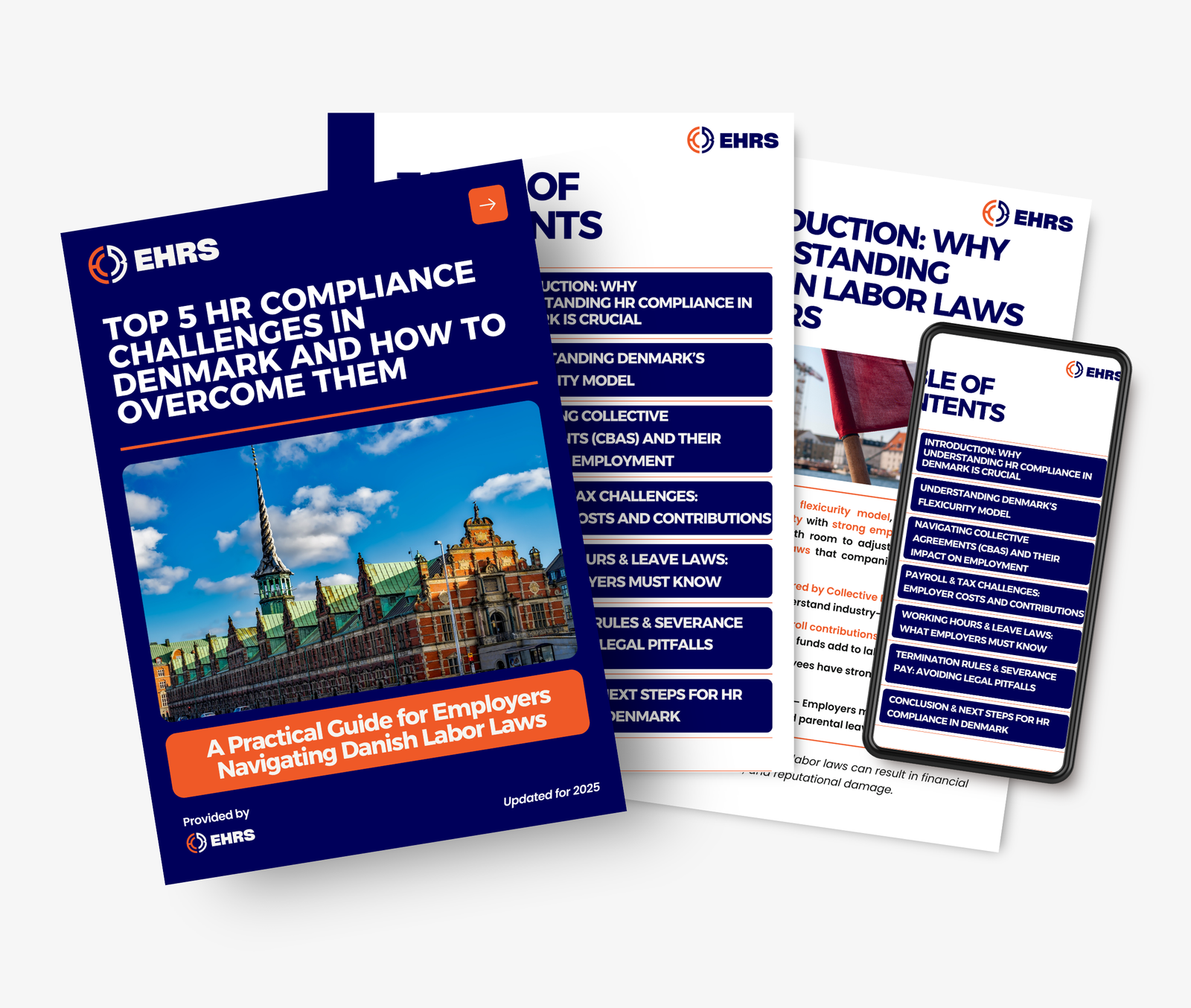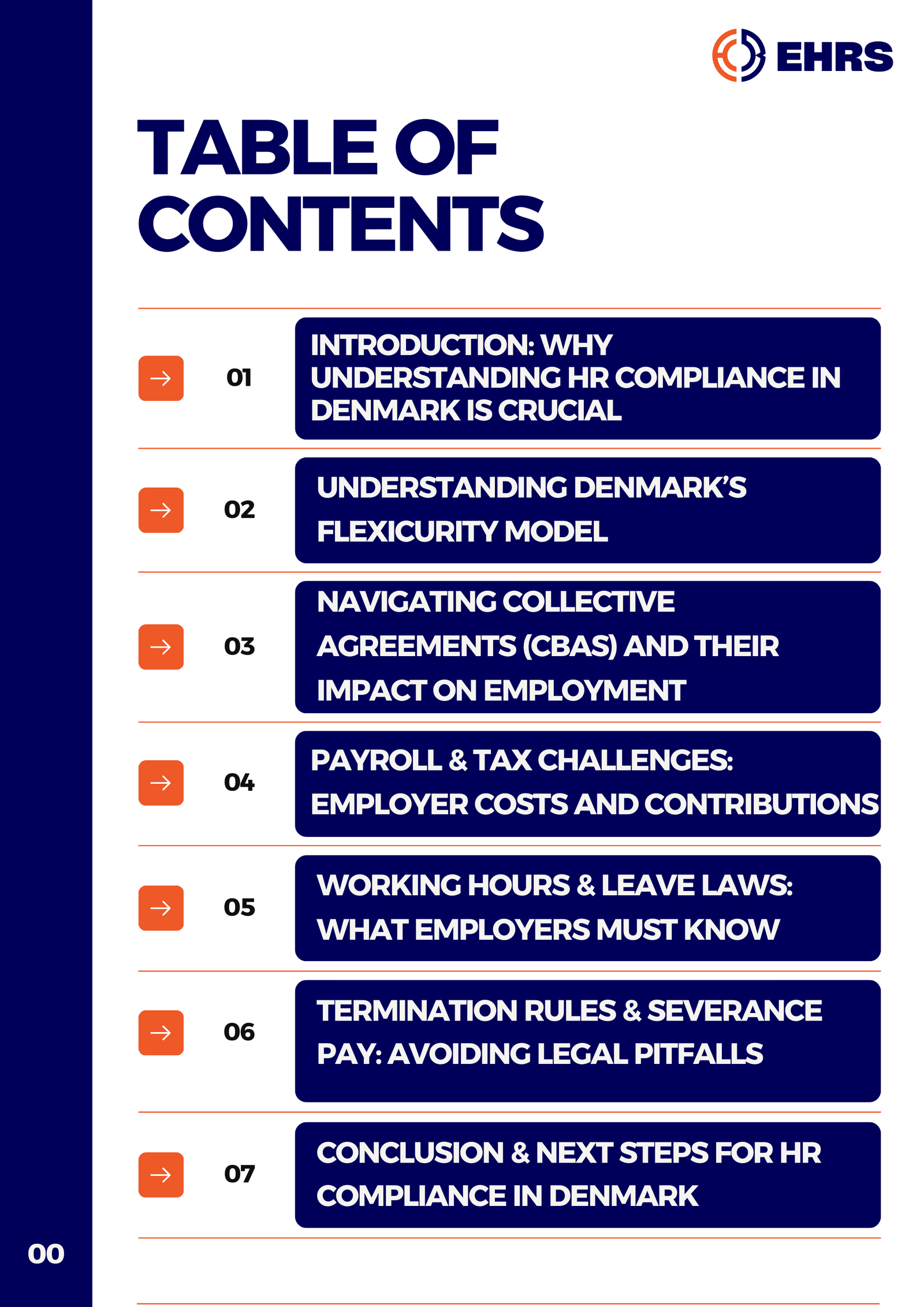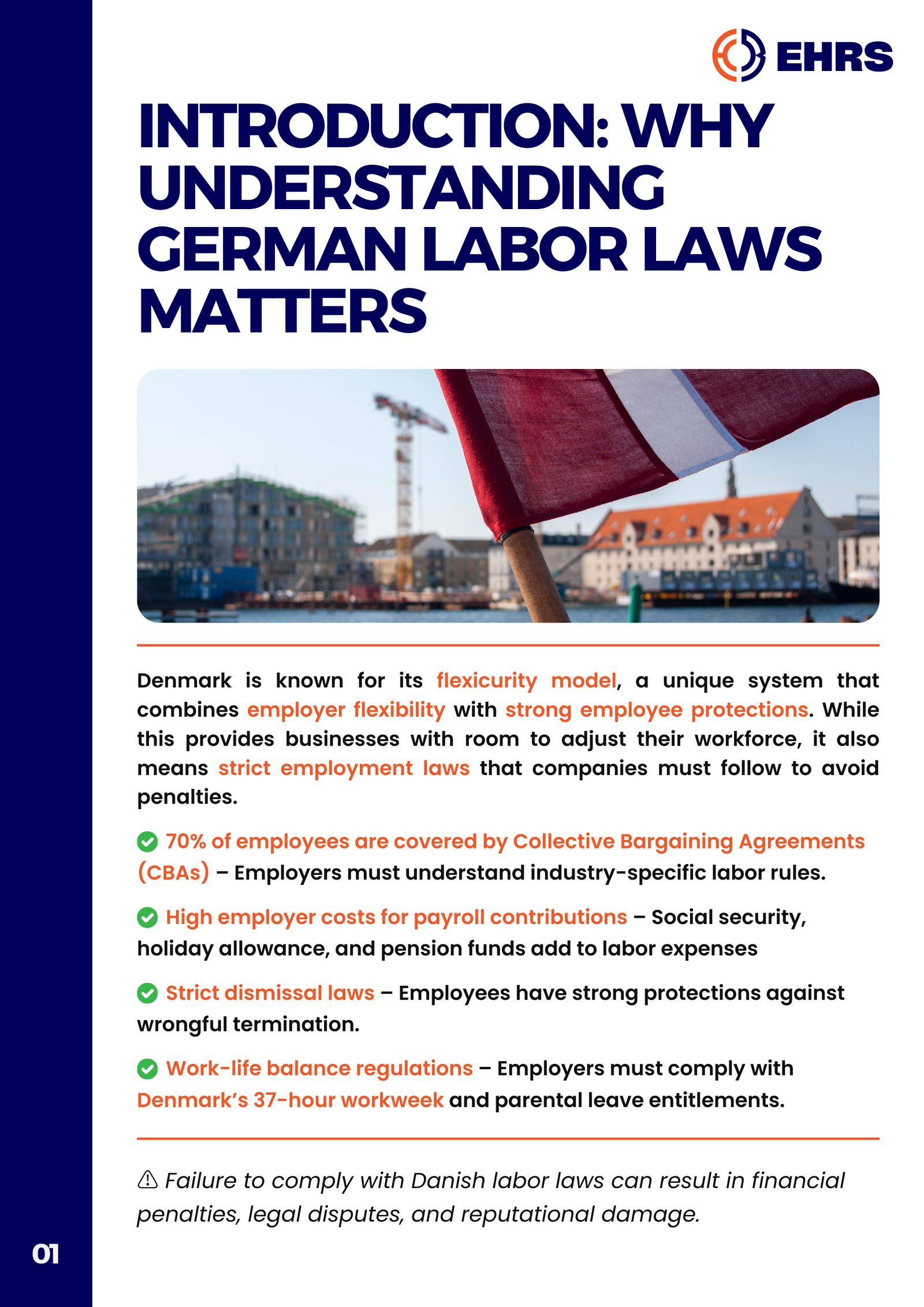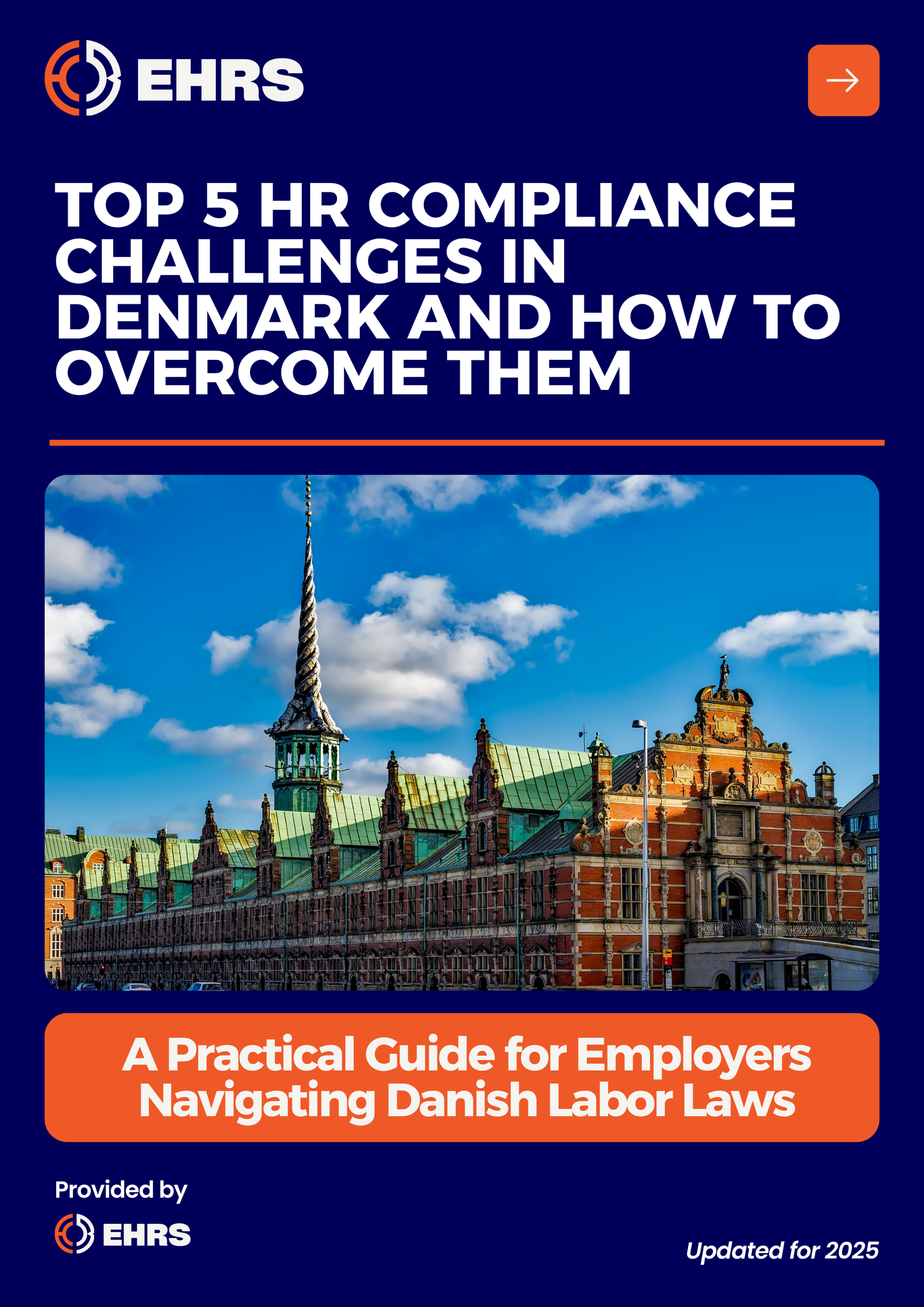DENMARK
List of countries
HR Services for Denmark
Hire in Denmark without opening a local entity. We manage employment contracts in line with Danish labor law, handle mandatory social security registration, oversee payroll, and ensure compliance with tax regulations. Our tailored HR services for Denmark help you expand seamlessly while staying fully compliant.
Known for its consistent ranking as one of the world’s happiest countries, Denmark provides many exciting opportunities for US and UK businesses to grow and expand their reach. However, it’s important to consider what aspects of your business should be developed inhouse and what work you should outsource.
HR outsourcing in Denmark can help US and UK companies to stay on top of employment laws and provide their teams with a phenomenal work environment.
ALL YOU NEED TO KNOW ABOUT
HR OUTSOURCING IN DENMARK
DANISH EMPLOYMENT
REGULATIONS TO KNOW
THE BENEFITS OF
EXPANSION IN DENMARK
THE CHALLENGES OF
EXPANSION IN DENMARK

Check our free HR guide to help you quickly improve your HR in Denmark
FAQ for Denmark
Learn more about Denmark
Free Download
Request your free guide and receive it immediately

All You Need to Know About Outsourcing
Your HR in Denmark with EHRS
Streamlined HR Operations
Europe HR Solutions handles payroll, compliance, recruitment, and employee management, ensuring your HR processes in Denmark run efficiently. With our expert HR services for Denmark, your business can focus on growth while we manage the administrative complexities.
Compliance with Danish Laws
Denmark’s labor laws emphasize employee rights, collective agreements, and work-life balance. Our team ensures compliance with local regulations, avoiding costly mistakes or penalties.
Cost-Effective HR Solutions
Outsourcing HR with Europe HR Solutions eliminates the need to hire and train an in-house HR team, reducing costs while maintaining high-quality HR management.
Denmark Employment Regulations to Know
Flexicurity Model
Denmark operates under a unique “flexicurity” system that combines flexible hiring and firing practices with strong social security for employees. Through our tailored HR services for Denmark, we help you navigate this model and manage employment relationships effectively.
Working Hours and Overtime
The standard workweek is 37 hours, with overtime rules determined by collective agreements. Employers must ensure compliance with these agreements, as they often define compensation for extra work.
Mandatory Employer Contributions
Employers in Denmark are required to contribute to social security programs covering pensions, health insurance, and unemployment benefits. These contributions are essential for compliance and employee satisfaction.
The Benefits of Expansion in Denmark
Thriving Economy
Denmark boasts a stable and innovative economy, consistently ranked as one of the best places in the world for business due to its ease of doing business and strong GDP.
Skilled Workforce
With a highly educated and English-speaking talent pool, Denmark provides access to top-tier professionals, particularly in sectors like technology, life sciences, and green energy.
Innovation and Sustainability
Denmark is a leader in sustainability and innovation, making it an ideal location for businesses focused on these areas. Its green energy policies and eco-friendly practices offer opportunities for businesses to align with global trends.
The Challenges of Expansion in Denmark
High Labor Costs
Denmark’s workforce is well-compensated, with high wages and mandatory benefits. Employers must carefully budget to manage these costs effectively.
Complex Collective Agreements
Many industries in Denmark are governed by collective labor agreements that dictate wages, working conditions, and benefits. Navigating these agreements requires expertise to ensure compliance.
Cultural Adaptation
Danish workplace culture emphasizes flat hierarchies, collaboration, and work-life balance. Companies must adapt their management styles to align with local expectations and norms.
Talk to an HR specialist about payroll, compliance, and audits today.
Expand into Denmark with confidence.
Most Asked Questions
About Denmark
Why do I need detailed employment contracts in Denmark? Isn’t a handshake enough?
While oral agreements are legally binding in Denmark, they lack clarity and leave room for disputes. Employers must provide a written contract for employees working more than 8 hours a week, starting from day one.
Why It’s Risk-Free: We ensure all contracts meet Danish requirements, protecting you from misunderstandings or legal claims.
Do I really need to track working hours in Denmark? Isn’t flexibility standard here?
The standard workweek in Denmark is 37 hours, and overtime must be managed according to collective agreements or employment contracts. Failing to track hours accurately can lead to disputes or penalties.
Why It’s Risk-Free: We provide tools to track and manage hours, ensuring compliance while supporting flexibility.
How much annual leave do I need to offer? Isn’t the statutory minimum enough?
Danish law grants employees 5 weeks of paid leave annually, with additional benefits often outlined in collective agreements. Offering less than the standard harms retention and risks non-compliance.
Why It’s Risk-Free: We ensure your leave policies meet legal standards while remaining competitive to attract top talent.
Parental leave seems excessive. How can I manage productivity with employees away for so long?
Denmark offers generous parental leave, including 14 weeks for mothers and shared leave for parents. Planning replacements ensures productivity while fostering employee loyalty.
Why It’s Risk-Free: We help you manage parental leave, including compliance and workforce planning, so your operations run smoothly.
Do I really need to follow collective agreements (CAs)? Can’t I just set my own policies?
CAs are not mandatory unless you’re part of an industry or union agreement, but they often govern essential terms like wages and overtime. Ignoring them can lead to disputes or legal action.
Why It’s Risk-Free: We assess whether CAs apply to your business and help you align your policies to avoid conflicts.
How do payroll taxes work in Denmark? What happens if I make a mistake?
Employers must deduct income tax, ATP (labor market pension), and social contributions. Errors in reporting can lead to fines and audits.
Why It’s Risk-Free: We handle payroll compliance, ensuring accurate deductions and timely filings with Danish authorities.
Why should I care about health and safety regulations? Isn’t Denmark already a safe workplace?
Employers are legally obligated to ensure a safe work environment, including conducting risk assessments. Non-compliance can result in fines and operational restrictions.
Why It’s Risk-Free: We provide risk assessments and safety policies, protecting your employees and shielding your business from liability.
Is compliance really worth it? Won’t it just add to my costs?
The cost of non-compliance—fines, lawsuits, and employee turnover—far outweighs the investment in doing things right. Compliance also builds trust with employees and stakeholders.
Why It’s Risk-Free: We streamline compliance, saving you time and money while building a legally secure and employee-friendly organization.
Are probation periods really necessary? Can’t I just fire someone who doesn’t work out?
Probation periods (typically up to 3 months) allow for easier terminations, but they must be explicitly outlined in the employment contract. Without one, dismissals must follow stricter rules, even for new hires.
Why It’s Risk-Free: We structure compliant probation terms, giving you flexibility while staying within legal boundaries.
Is overtime pay mandatory in Denmark? Can’t I just include it in salaries?
Overtime pay is not automatically required but is often dictated by collective agreements or contracts. Mismanaging overtime can lead to disputes or claims for unpaid wages.
Why It’s Risk-Free: We help you set clear overtime policies in line with Danish regulations and agreements, avoiding costly mistakes.
Do I need to pay employees for sick leave? Won’t the state handle it?
Employers are obligated to pay full salary for the first 30 days of sick leave. Beyond that, sickness benefits are covered by the state, but only if proper documentation is filed.
Why It’s Risk-Free: We manage sick leave policies and filings, ensuring compliance while reducing the administrative burden on your team.
Termination laws in Denmark sound restrictive. What if I need to reduce staff quickly?
Termination requires valid grounds and compliance with notice periods, which range from 1 to 6 months depending on tenure. Skipping these steps can lead to wrongful dismissal claims.
Why It’s Risk-Free: We guide you through lawful termination processes, ensuring compliance and minimizing legal risks.
Are pensions mandatory in Denmark? What’s the benefit of offering them?
Pensions are often required by CAs or individual contracts. Not offering competitive pension benefits can harm retention and compliance.
Why It’s Risk-Free: We help you navigate pension obligations and design attractive packages that align with Danish expectations.
Can I still hire non-EU workers in Denmark? Isn’t the process too complicated?
Yes, non-EU workers can be hired under specific permits like the Positive List or Pay Limit Scheme, but failing to comply with immigration rules can lead to delays or fines.
Why It’s Risk-Free: We manage the permit process, ensuring compliance and smooth onboarding for global talent.
What happens if I fail a compliance audit in Denmark? Will it shut down my operations?
Non-compliance can result in financial penalties, legal claims, or reputational damage. Danish authorities closely monitor payroll, contracts, and workplace practices.
Why It’s Risk-Free: We conduct proactive compliance reviews, ensuring you’re fully prepared for inspections and audits.



